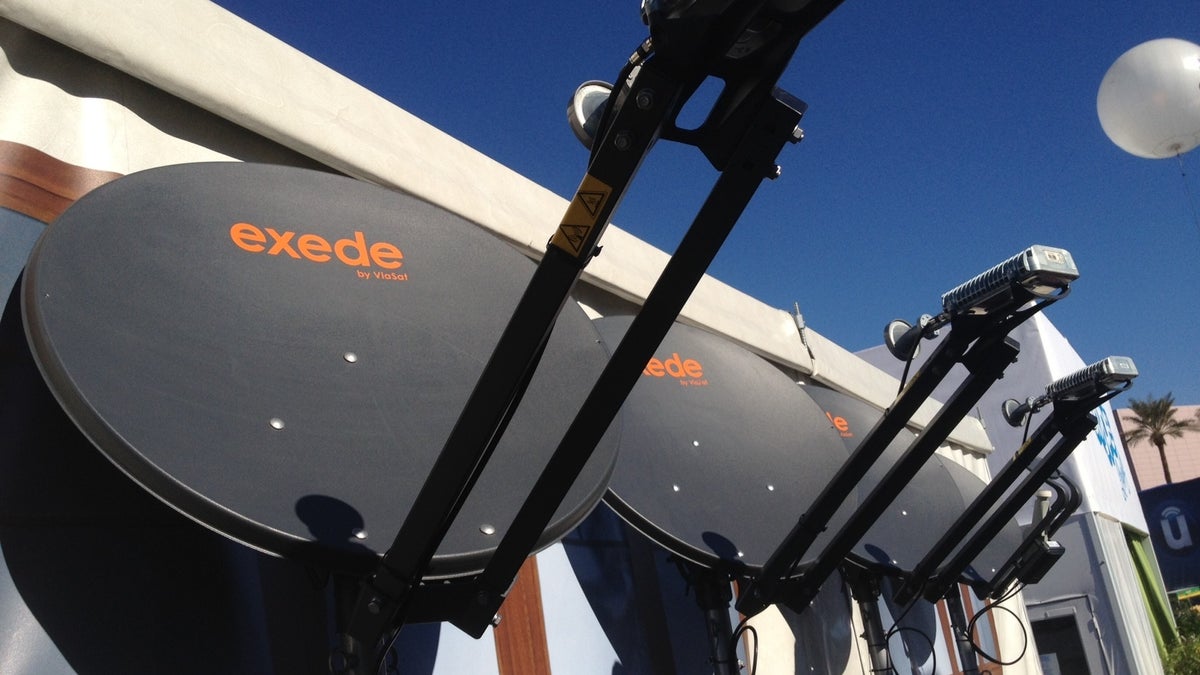Exede: The satellite broadband service you've been waiting for?
ViaSat has launched Exede, its new high-speed satellite Internet service, offering what it describes as a "feels-like-fiber" experience. Is it a game changer for rural America and Wi-Fi service on airlines?
Buried among the gadgets, superthin screen OLED TVs, and all the other products we saw at CES this year was something not terribly sexy-looking, but something that will potentially affect millions of people living in rural America.
It's Exede, a new satellite broadband service from ViaSat that just launched this week. Yes, you heard right, satellite, those contraptions that orbit the earth, and until now a very sluggish way to receive Internet service (satellite has frequently been referred to as the Internet service of "last resort").
However, thanks to the launch of ViaSat-1, a next-generation satellite system that was launched in October of last year, satellite-based Internet service just got a lot more attractive, with ViaSat saying it will offer up to 12Mbps downstream and up to 3Mbps upstream starting at $50 per month with a setup fee of $149.99. Those throughput numbers represent huge speed increases over the previous version of the company's service, which topped out at 1.5Mbps downstream and a mere 256Kbps upstream (the entry-level $50 service only delivered 512Kbps downstream and 128Kbps upstream).
In Las Vegas, ViaSat had a demo system set up, and I had a chance to browse some Web pages and stream video and was all in all impressed with what I saw. While this wasn't an independent system I'd set up at my home, you can see from the speed tests that the service exceeded the downstream number and fell a little short on the upstream number. ViaSat says the 12 and 3Mbps are the "average speeds" it expects customers to get.
In Las Vegas, we were under clear skies and didn't have any trouble receiving service. How things would go under harsher conditions I can't tell you yet, but ViaSat claimed that what I saw was what I could expect to get.
Along with the new satellite, which cost about $400 million to launch, the company also built a whole new ground system that includes some fancy Web-acceleration technology.
There are some caveats, of course. That $50 entry price has a cap of 7GB, which Moore says represents what the typical broadband user consumes monthly. Also, right now only the East and West Coasts of the U.S. are able to achieve the highest speeds of ViaSat's Exede12 service. The rest of the country gets the Exede5 service, which offers 5Mbps downstream/1Mbps upstream. (You can check here which service you qualify for in your area.)
For "lighter" users who don't plan on streaming a lot of video (online multi-player gaming is obviously a no-no with satellite broadband due to both cap and latency issues), the 7GB should suffice. But the service gets significantly more expensive as you step up your cap levels. If you go over your cap, you'll get throttled to a crawl, but ViaSat doesn't shut off your service.
It's also worth noting that Dish will be bundling an Exede plan with its satellite TV service starting this summer for $79.95 for the most basic package (Dish calls its satellite broadband service Dish Broadband). That bundle includes the base tier of Exede service and has a 5GB cap.
Later this year, JetBlue and Continental are expected to launch in-flight Wi-Fi services that use Exede, and Moore says speeds will be much faster than GoGo , which uses a ground-based cellular system for Internet service.
Moore says that you should be able to stream Netflix on flights and the Exede service is much cheaper for airlines to use than GoGo.
"We can't speak for the airlines," says Moore, "but you may see carriers offer Wi-Fi for free in the future."
I won't hold my breath on that one, but having flown JetBlue to Vegas and watched free DirectTV the whole way, a little free Wi-Fi added in doesn't seem out of the realm. Now if they'd only stop charging $35 for that second checked bag.


